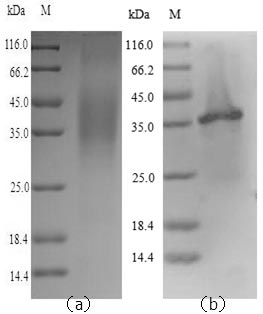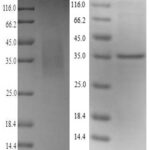Human Legumain / LGMN Recombinant Protein Product Attributes
Product Type: Recombinant Protein
Recombinant Legumain / LGMN based upon sequence from Human
Host: QP6301 protein expressed in E.coli, Yeast..
Tag: His
Protein Construction: A DNA sequence encoding the Homo sapiens (Human) Legumain/ LGMN, was expressed in the hosts and tags indicated. Please select your host/tag option, above.
Recommended Applications: Immunogen, Protein Standard, Cell culture, or Other Cell Biology Applications.
Application Notes: Please contact us for application specific information for QP6301.
Bioactivity Data: Untested
Full Length? Full Length of Mature Protein
Expression Region: Val18 – Asn323
Amino Acid Sequence: VPIDDPEDGG KHWVVIVAGS NGWYNYRHQA DACHAYQIIH RNGIPDEQIV VMMYDDIAYS EDNPTPGIVI NRPNGTDVYQ GVPKDYTGED VTPQNFLAVL RGDAEAVKGI GSGKVLKSGP QDHVFIYFTD HGSTGILVFP NEDLHVKDLN ETIHYMYKHK MYRKMVFYIE ACESGSMMNH LPDNINVYAT TAANPRESSY ACYYDEKRST YLGDWYSVNW MEDSDVEDLT KETLHKQYHL VKSHTNTSHV MQYGNKTIST MKVMQFQGMK RKASSPVPLP PVTHLDLTPS PDVPLTIMKR KLMNTN
Purity: Greater than 90% as determined by SDS-PAGE.
Reconstitution Instructions: Concentrated protein in liquid format. Reconstitution is not necessary.
Concentration of Human Legumain / LGMN Protein:
Endotoxin Levels: Not determined.
Buffer: Tris-based buffer, 50% glycerol
Storage Conditions: Store at -20C to -80C.
| Recombinant Human Legumain / LGMN Protein General Information | |
|---|---|
| Curated Database and Bioinformatic Data | |
| Gene Symbol | Lgmn |
| Entrez Gene ID | 5641 |
| Ensemble Gene ID | ENSG00000100600 |
| RefSeq Protein Accession(s) | NP_001008530.1 |
| RefSeq mRNA Accession(s) | NM_001008530.2, NM_005606.6, XM_005267862.3, XM_005267863.3, XM_017021463.1, XM_017021464.1, XM_017021465.1, XM_017021466.1, XM_017021467.1 |
| UniProt ID(s) | Q99538 |
| UniGene ID(s) | Hs.18069 |
| HGNC ID(s) | HGNC:9472 |
| COSMIC ID Link(s) | Lgmn |
| KEGG Gene ID(s) | hsa:5641 |
| PharmGKB ID(s) | PA30354 |
| General Description of Recombinant Human Legumain / LGMN Protein. | |
| Has a strict specificity for hydrolysis of asparaginyl bonds. Can also cleave aspartyl bonds slowly, especially under acidic conditions. Required for normal lysosomal protein degradation in renal proximal tubules. Required for normal degradation of internalized EGFR. Plays a role in the regulation of cell proliferation via its role in EGFR degradation (By similarity). May be involved in the processing of proteins for MHC class II antigen presentation in the lysosomal/endosomal system. | |
Limitations and Performance Guarantee
This is a life science research product (for Research Use Only). This product is guaranteed to work for a period of two years when stored at -70C or colder, and one year when aliquoted and stored at -20C.





There are no reviews yet.